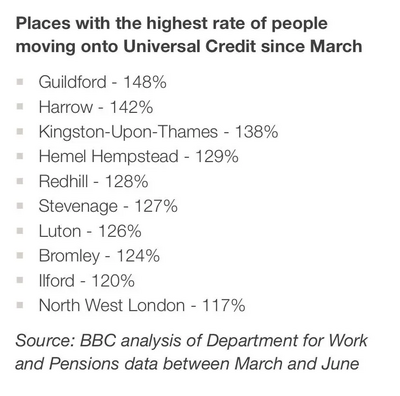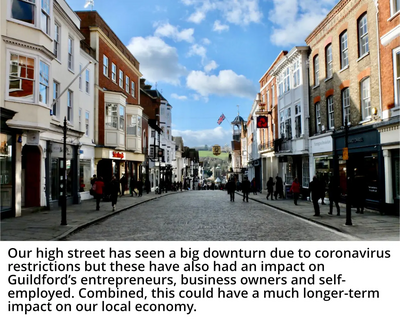148% increase in benefit claims - where do we go from here?

Last Friday the BBC broke the news that since March there has been an 81% increase in people claiming benefits. Sad, but unsurprising given that March marked the start of the coronavirus lockdown. However, a few paragraphs in, the stats from the BBC were even more devastating - in Guildford the increase has been a jaw-dropping 148%.
I've spent a lot of time reflecting on this over the past weekend, and in particular why such a high increase locally and what the potential impact is for us as a community.
Since lockdown first started in March, I've been helping fundraise for a project called Stoke Community Support (SCS) which was formed to support local families struggling due to illness or financial difficulties caused by coronavirus. When the project first started out, we were supporting 45 families: it's now up to 140.
The growing numbers of families needing a helping hand has been worrying me for some time as I've sensed it is just the tip of the iceberg, especially given that SCS is working in a specific, relatively small area of Guildford. The figures from the BBC confirm that and I'm sure there will be many other families and individuals who are currently not claiming benefit either because they're just outside the threshold for claiming or they are reluctant to do so.

A key reason for Guildford's increase is the fact that we have above-average numbers of people who are self-employed. Six months of restrictions present very immediate challenges for local self-employed workers and their families, but potentially have a longer-term impact on our local economy too. Whether entrepreneurs, business owners or people employed in the creative sector or other industries, self-employed workers are a core part of what makes Guildford and Cranleigh tick. The longer necessary restrictions are in place as the Government seeks to control the coronavirus outbreak, the more of a threat there is to these livelihoods.
I'm deeply concerned that, with coronavirus cases on the rise again as we head into the autumn and the Government furlough scheme ending at the end of October, we will find ourselves as a community seeing a further increase in benefit applications. This will be because employed local people coming off furlough payments may find that their job is no longer available due to the economic downturn and the self-employed who may have managed so far to make ends meet finding themselves no longer able to do so. This is a worst-case scenario which I sincerely hope doesn't play out, but I believe that it's crucial that political and local leaders consider it a realistic possibility and where possible prepare for such situations - to fail to do so is to fail our community.
Looking at this situation I'm convinced that the right response from Government would be as follows:
- Extend the furlough scheme - the furlough scheme has been a lifeline for so many people whose employers were shut down or suffering dramatic loss of business. The scheme has been essential in preventing mass unemployment.
- Provide additional support for specific sectors including the creative industry - coronavirus has not been felt equally across all sectors. For example, our world-leading creative sector will, without additional support, emerge smaller, weaker and with lasting damage. I'm grateful for the work done by Lib Dem MP Daisy Cooper on a potential support package to reinvigorate creative industries, details of which can be found here: https://www.libdems.org.uk/creativesector-plan
- Act now to ensure that the 3 million people excluded from government help so far get the support they need - new starters, newly self-employed and freelancers are all facing difficulties accessing the existing support schemes. They cannot be left behind and the Government has the power to prevent that but they must do it now. You can find out more about the campaign to get help for these people, led by Lib Dem MP Jamie Stone, here: https://www.libdems.org.uk/3m-excluded
- Cancel plans to reinstate benefit sanctions - during lockdown the government suspended benefit sanctions which see people have their payments cut off for things like being late for appointments at job centres or for being unable to attend a job interview. With unemployment rising, and many people in situations where jobs they might be qualified for either might not be hiring or might be unsafe for them to do during the pandemic, the government must not go ahead with their planned reinstatement of these sanctions. Research has already proven that the sanctions do not make people any more likely to find work, and there can be no justification for using them to penalise the unemployed during the worst economic collapse since the Great Depression.
- Begin work to pave the way to introducing a Universal Basic Income - the coronavirus has laid bare the inequality of our society and the knife-edge on which many people live. It has also highlighted the problems of having to put in reactive measures such as the furlough scheme and as a result, missing out so many who are struggling.
A basic income would provide a real safety net for those who fall on hard times without those in need having to jump through the inhumane, counter-productive, and needlessly bureaucratic hoops of the current benefits system. Instead, every one of us would know that there would always be a basic amount of income for us to fall back on should we find ourselves needing it - such as if we find ourselves out of work, needing to deal with a family crisis, or if another pandemic strikes.
11th August 2020
